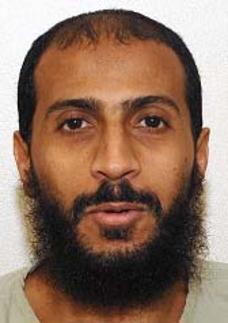Two Guantánamo Cases Make It to the Supreme Court; Experts Urge Justices to Pay Attention

Guantánamo prisoner Ali Hamza al-Bahlul, who is seeking to have his conviction for conspiracy overturned by the Supreme Court.
By Andy Worthington, June 11, 2017
Even before the Bush administration set up its "war on terror" prison at Guantánamo Bay, Cuba, legal experts were profoundly alarmed by proposals for how those seized as alleged terrorists would be tried. On November 13, 2001, President Bush signed a military order prepared by Vice President Dick Cheney and his senior lawyer, David Addington, which authorized the use of military commissions to try prisoners seized in the "war on terror," preventing any prisoner from having access to the U.S. courts, and authorized indefinite detention without due process.
Under the leadership of Michael Ratner at the New York-based Center for Constitutional Rights, lawyers prepared to challenge the proposals in the military order in the courts. The stripping of the prisoners’ habeas corpus rights and the prevention of their access to the courts eventually made it to the Supreme Court in June 2004, when, in Rasul v. Bush, the Court, for the first time ever in wartime, ruled against the government, granting the prisoners habeas corpus rights.
Lawyers were allowed into Guantánamo, piercing the veil of secrecy that had allowed a regime of torture and abuse to thrive unmonitored, although President Bush immediately persuaded Congress to pass new legislation that again stripped the prisoners of their habeas rights. Further legal struggles then led to habeas rights being reintroduced in another Supreme Court case, Boumediene v. Bush, in June 2008.
The military commissions, meanwhile, limped on until June 2006, when, in another Supreme Court case, Hamdan v. Rumsfeld, the Court ruled that the commissions lacked "the power to proceed because its structures and procedures violate both the Uniform Code of Military Justice and the four Geneva Conventions signed in 1949."
Again, Bush turned to Congress to revive the commissions, which they dutifully did, although legal experts warned that at least some of the war crimes for which prisoners were to be charged — especially the common charge of providing material support for terrorism — were not recognized as war crimes, and that any convictions were likely to be overturned on appeal.
When Barack Obama became president, the commissions were put on hold until a review was conducted, which revived them again, despite an increase in the criticism of prosecuting war crimes invented by Congress. For more information, see my articles from the time, Military Commissions: Government Flounders, As Admiral Hutson Nails Problems, Former Insider Shatters Credibility of Military Commissions (featuring former Guantánamo prosecutor Lt. Col. Darrel Vandeveld) and David Frakt: Military Commissions A Catastrophic Failure.
Since then, the warnings have come true. In October 2012, the court of appeals in Washington, D.C. overturned the material support conviction for Salim Hamdan, a driver for Osama bin Laden, who had been convicted in August 2008 and released just five months later. In January 2013, the court also overturned the conviction for material support, conspiracy, and another charge, solicitation, in the case of Ali Hamza al-Bahlul, a Yemeni who had made a promotional video for al-Qaeda and had been convicted after a one-sided trial in which he refused to mount a defense in November 2008, receiving a life sentence.
In July 2014, on appeal, a full, en banc court confirmed the decision to overturn the conviction for material support and solicitation, but issued a fractured ruling on the conspiracy charge. However, in July 2015, that conviction was overturned, although that decision was then appealed, and in October 2016, the en banc court reinstated it. As I wrote at the time, "It is now likely to make its way to the Supreme Court."
That has indeed happened. Last month, a petition from al-Bahlul arrived at the Supreme Court, along with another petition by Abd al-Rahim al-Nashiri, a "high-value detainee," held in CIA "black sites" before his arrival at Guantánamo in September 2006, who has been charged with involvement in the attack on the USS Cole in 2000.
The al-Bahlul and al-Nashiri cases
Reporting on the case for Just Security on May 31, Steve Vladeck noted that, in the October 2016 ruling upholding al-Bahlul’s conspiracy conviction, Judge Brett Kavanaugh had, nevertheless, "stressed the significance of the question raised in that case, i.e., whether military commissions at Guantánamo may constitutionally try domestic offenses like standalone conspiracy."
Kavanaugh stated, "The question of whether conspiracy may constitutionally be tried by military commission is extraordinarily important and deserves a 'definitive answer.' The question implicates an important part of the U.S. Government’s war strategy. And other cases in the pipeline require a clear answer to the question. This case unfortunately has been pending in this Court for more than five years. It is long past time for us to resolve the issue squarely and definitively."
As Vladeck added, however, "the D.C. Circuit did not resolve the issue 'squarely and definitively,' instead fracturing over the grounds on which a 6-3 majority affirmed Bahlul’s conspiracy conviction," but now, with the two cases before them, the Court should recognize that "Judge Kavanaugh had it right — 15 years into the military commission experiment, over 10 years after the enactment of the Military Commissions Act (MCA), and almost nine since the commissions’ first convictions, the time has long-since passed for the Supreme Court to settle the validity of the commissions’ jurisdiction."
Vladeck also noted that the Bahlul rulings to date have "left open the far more significant constitutional issue, i.e., whether the commissions could try domestic offenses when the defendant’s conduct post-dated the enactment of the [Military Commissions] Act, or whether the Constitution more generally limits the jurisdiction of military commissions to international war crimes. That’s the question that has finally reached the Supreme Court in al Bahlul v. United States."

The "high-value detainee" Abd al-Rahim al-Nashiri, who is challenging the legitimacy of his trial by military commission.
Turning to al-Nashiri’s case, Vladeck explained that, "Unlike al Bahlul, al Nashiri has been charged with offenses that more closely resemble international war crimes. The problem in his case is when (and against whom) the acts occurred — including the October 2000 attack against the USS Cole, and the 2002 bombing of the French tanker M/V Limburg. The MCA itself limits the commissions' jurisdiction to offenses committed during 'hostilities,' which the statute elsewhere defines as 'any conflict subject to the laws of war.' So the question in al Nashiri is whether either of those terrorist attacks took place in a 'conflict subject to the laws of war,' i.e., whether we were at war with al Qaeda in October 2000, and whether the French were at war with al Qaeda in 2002."
In the lower courts, al-Nashiri hit a wall when "a divided panel of the D.C. Circuit abstained from resolving [his] habeas petition," invoking a doctrine in which "civilian courts usually leave challenges to military trials to the military courts in the first instance." Vladeck, however, has contributed to an amicus brief, submitted by the National Institute of Military Justice, in which, as he states, "there are compelling reasons why (1) [the] abstention should not apply to the military commissions at all; and (2) even if it applies to some claims, al Nashiri’s challenge to the subject-matter jurisdiction of the military commissions is the exact kind of claim for which abstention is inappropriate, since he is claiming the very essence of a 'right not to be tried.'" The NIMJ has also submitted an amicus brief for al-Bahlul.
In al-Nashiri’s case, another amicus brief was submitted by a dozen retired admirals and generals, including Marine Brig. Gen. Michael Lehnert, who was the first commander of the prison at Guantánamo. As Carol Rosenberg explained in the Miami Herald, "The retired officers argue that the justices should decide the threshold issue of the 'legitimacy and legality' of Nashiri’s military commission now — rather than after a conviction, as Congress intended — for national security reasons."
As lawyers for the generals and admirals state, "An unlawful military trial is a powerful weapon for extremist groups, further reinforcing their narrative of a hypocritical and amoral United States at war with Islam. Clearly demonstrating the legality of military commission trials is crucial to maintaining the legitimacy of the counterterrorism mission and protection of U. S. national security. Allowing a trial of questionable legality to proceed would come at a significant strategic cost."
They also state, "Virtually no one thought, and the United States never claimed, that at the time of the charged offenses the United States was in an armed conflict in Yemen governed by the extraordinary rules of war. It was only in the context of the executive branch’s later attempts to try [Nashiri] via military tribunal that it began to retroactively claim that there had been an armed conflict."
The Court is not expected to decide whether to hear the cases until after the summer recess, but it is very much to be hoped that they do. As Steve Vladeck concluded in his article, "it’s long-past time for the courts to settle the jurisdictional bounds of the military commissions, one way or the other, rather than allowing the commissions to continue to operate under a cloud of illegitimacy, as their critics continue to claim that they are exercising jurisdiction forbidden by the MCA itself and/or the Constitution. In al Bahlul, the jurisdictional issue is structural; in al Nashiri, it’s more specific, but also more immediately fraught, since the Petitioner faces the spectacle of a capital trial that might be vacated on appeal — but perhaps as much as a decade from now. But both cases present examples of the same phenomenon — the need for the final arbiter of the meaning of federal law to answer the most significant questions lurking over the Guantánamo military commissions."




